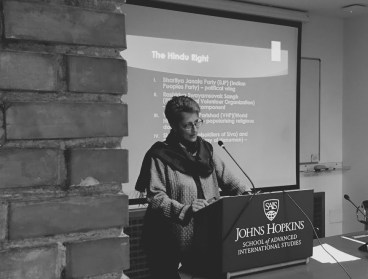
Ratna Kapur Discusses Indian Constitutional Law and the Role of Hinduism in Its Practice

BY UTPALA MENON
On Monday, October 10, Ratna Kapur joined SAIS students for a conversation on her area of expertise: the role of culture and tradition in law. The event was a part of the speaker series with the Bologna Institute of Policy Research (BIPR) and specifically addressed Indian Constitutional Law from a faith perspective. Titled “Secularism, Religion and Hindu Majoritarianism in Indian Constitutional Law,” the conversation explored the role of Hindutva in shaping the judgments passed by modern Indian Constitutional Law.
Kapur has been a visiting professor at a number of international law schools including NYU School of Law, Georgetown University Law Centre and the United Nations Peace University. She has also been a visiting fellow at Harvard Law School and Senior Advisor to the United Nations Mission in Nepal. Her most recent book discusses the concept of freedom from illiberal perspectives. This topic was reflected in Monday’s event, during which she walked the audience through secularism, religion and the role they play in the Indian Constitution.
According to Kapur, Indian religious pluralism, often marketed as ‘Incredible India’, reflects some deep societal inconsistencies. Kapur posits that recent decades have been marked by a disintegration of real Indian pluralism, despite the many religious communities within its borders. Hindutva, a form of Hindu nationalism, is a major part of right wing politics in India and is evident from the principles of dominant political parties.

While politics have always had religious aspects in India, what concerns Kapur and others is Hindutva’s strong influence on the legal judgments made by Indian courts during many cases involving religious minorities. Kapur asserts that a larger part of the problem deals with the misreading of secularism as a concept of Indian Constitutional Law and the politicization of the Hindu Ideology to dominate non-Hindu and minority rights.
Hindutva nationalists argue for secularism to be the equal treatment of all religious communities. However, Kapur believes that they tactfully use this stance to assert that various minority rights such as access to education are in violation of the constitutional mandate to treat all citizens equally. This irony makes the phenomenon of Hindutva politics a scary prospect in the constitutional law of Indian democracy.
While the talk made some interesting points about secularism specifically in India, Kapur also impacted the international perspectives of various students. first-year MA student Phil Kamper reflected on the topic of religion, secularism and the separation of church and state in Europe. “It was an exceptional talk,” said Kamper, “and underlined the need for a broad public debate on equality and freedom of religion while maintaining human rights and fighting bigotry. We can see that the rise of the far-righting populism challenges this convention. Victor Orban and Marine Le Pen readily invoke Christianity as a defining European feature, ignoring the secular tradition of pluralism and humanism within European society.”
Additionally, other students found the topic particularly relevant to other social considerations such as the treatment of women in Indian society.
The President of the Global Women in Leadership club, Chelsea Sommer, said, “I thought it was incredibly interesting when she described how the Bharatiya Janata Parta (BJP) in India also claims to be saving Hindu women from Islam, particularly because during the time I spent living in India, I saw first-hand how regressive the BJP’s stance is towards women.”
“It was especially alarming,” Sommer continued, “that the judicial system, depending on their definition of secularism, can actually dictate how religious meanings are practiced and interpreted, and may actually be severely damaging to plurality and equality”.
The talk ends on a note suggesting the desperate need for change in order to combat the transgressions against minorities by Hindu majoritarianism. While Kapur dismisses any potential security threat from Hindutva, she suggests that it has normalized and neutralized what was once a pluralistic society.

